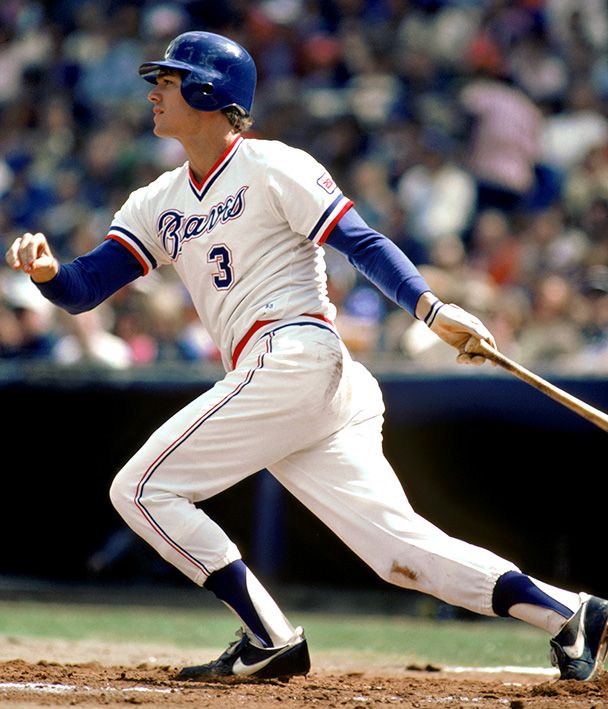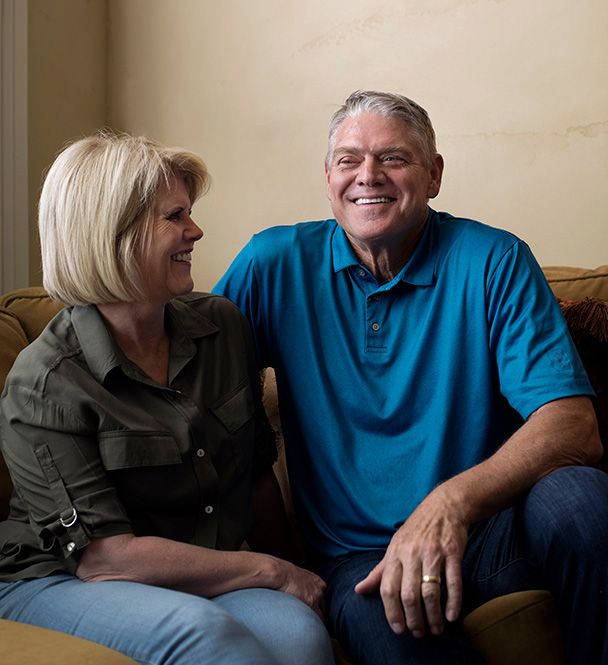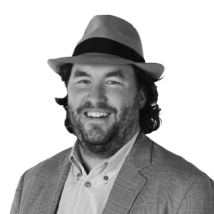5:02 am | July 28, 2018 | Go to Source | Author:
HE MADE A real effort to keep his attention inward on his family. They sold their house in a regular neighborhood after the 1984 season and moved to a 10-acre farm behind a gate. “Murphy” wasn’t on the mailbox. Pines and oaks hid the house. They had a pond with two swans. Dale and his family worked together in the garden, growing things like tomatoes, cucumbers and squash. He built them a scarecrow to protect the crop.
In public, he was still Dale Murphy: seven-time All-Star, winner of the 1988 Roberto Clemente man of the year award.
In private, he was Dad.
Nancy kept reminding him to re-center. There’s a picture he thinks about a lot. It’s a candid of him in the bowels of Candlestick Park on a pay phone. The game is about to start, a crowd cheering and waiting to see its heroes in the flesh, but he’s calling Nancy and his family. He’s calling home.
He didn’t miss a game between 1982 and 1985. His career began a sharp decline after 1987. His home runs slowed, but the strikeouts did not. He was traded in 1990 to the Phillies, hoping to get out of what he called a “rut.” His longtime rival Mike Schmidt even sent a videotape that showed some ways of dealing with the effects of age on a swing. Three years later, he took a pay cut to move to the expansion Rockies. Injuries and a staph infection left him hobbled, a shell of his former self. Halfway through the season, and playing in the thin air just two home runs shy of 400, he couldn’t do it anymore. A lot of guys would have stayed to get those last two homers, but he missed his family.
He called Nancy and told her he couldn’t even run. “I’m coming home,” he said.
Now, 25 years later, her voice cracks telling that story. She was pregnant then with Madi, their youngest.
“I can’t even explain it,” she says. “There are no words. I had a weight lifted off my shoulders: ‘Oh, thank you, thank you …'”
They left Georgia and, after managing Mormon missions in Boston, settled in Utah. Dale faded from the spotlight.
His whole life he’d been a ballplayer.
“He was really trying to find himself,” Chad says. “‘Who am I now?'”
Dale decided he was a father and devoted himself fully to the kids. He didn’t get crazy rich, but he’d made enough as a player to never miss a moment now as a dad. The madness of their home became his life. Eight children, seven of them boys, all big enough that three would play college football. Every day, they collectively drank a gallon of milk and ate three dozen eggs. The boys shared underwear and socks, picking them out of a massive bin. Holes got knocked in walls. Dale would find a Nolan Ryan-signed baseball in the bushes. Nancy did 10 loads of laundry a day. They tried to support everyone’s dreams. “The thing we figured out as parents,” Nancy says, “you gotta let them find what they love on their own. The thing you have to tell your child to stop doing to go to sleep, that’s the thing they love.”
Dale drew with his son Tyson or called former NFL players for advice for Jake. He’d come home with records he thought were cool, listening to Death Cab for Cutie because he thought Chad might like them. Chad didn’t really like Death Cab, but even then he realized that his dad was trying to find common ground they could share during turbulent teenage years. After Dale retired, Chad told his father he wasn’t going to try out for the basketball team. He had other interests. He liked music.
That night, Dale took Chad to a store and got him an electric guitar.

Murphy hit 398 career home runs, nabbed two MVP trophies, and ended his career as a hero to millions, including the members of R.E.M. Rich Pilling/Getty Images
IN THE YEARS after baseball, the Murphy kids don’t remember Dale bringing up the Hall of Fame, and with his next window of eligibility coming soon, it remains other people who talk about it most often.
There’s no precedent at work, or one to be set, by his candidacy. He’s an outlier. He finished his career in the steroid era, the exact kind of player who would have benefited greatly from some anti-aging elixir. His decline happened as the Bash Brothers were born. He remembers sitting in the Braves’ clubhouse with Glenn Hubbard and talking about players juicing. Hubbard turned to him and said, “You know how many home runs you could hit if you got on steroids?”
If baseball wants to wash itself clean from steroids, the best way to do it isn’t to keep Bonds out of the Hall but to let Murphy in. Induct cheaters but also celebrate Dale Murphy for his 398 home runs and for the dozens he did not hit. He finished just two short of 400, and only four eligible players not linked to steroids have 400 or more homers and are not in the Hall. None was ever MVP. Murphy’s recognition is a vote about the culture we want. That’s the point Chad Murphy made five years ago in an open letter to Hall of Fame voters. He titled it: “Making the HOF Case for Dale Murphy, or, The Guy Who Changed My Diapers.”
In Dale’s last year of regular eligibility, his kids all got involved in big and small ways. They tweeted and gave interviews. Chad’s letter went viral, and his argument helped drive Murphy’s vote percentage higher than it had been in 13 years. Taylor Murphy started an online petition. He printed the names and gave them to Dale, to say: All these people love you. His children’s table-pounding felt like the greatest validation of Dale’s choices about focusing on his family instead of his fame. In the end, getting in didn’t matter nearly as much as seeing how much his children wanted him to get in.
“What the kids did, it was the most emotionally moving time for me as a father,” he says. “All those years of saying our family comes first …”
“… it was about the Hall of Fame,” Nancy says, “but it was more about how much they loved him.”
Tyson Murphy, a successful video game artist, drew a comic strip that ran in USA Today. Dale says opening the email and seeing the attached drawing remains one of the great milestones of his life, like his wedding day or the birth of his children. The first four panels show Murphy in his Braves uniform holding a bat and signing autographs and looking out from magazine covers. Tyson wrote: “When I was younger, my dad brought cities to their feet. He inspired millions. He was a hero.”
The last panel shows an enormous dad and a wide-eyed boy drawing together at a small table.
“But he was more than that to me,” Tyson wrote. “He was my dad.”
DALE AND I meet in Atlanta on a spring evening and walk to his restaurant, located near the Braves’ new ballpark. Murph’s has been open a year, part of Dale’s attempt to occupy his time now that the kids are out of the house. Truth is, he likes it most because he gets to walk through his dining room and greet his fans, who are always happy to see him. Tonight, within minutes, a grown man tells him that he wore No. 3 in Little League. Someone surprises her husband with Dale on FaceTime and her husband cries.
“It hits you harder,” Dale says. “I’ve got 12 grandkids now, and when people come up to me and share stories, it’s hard to put into words exactly what an honor it was to be part of their lives.”
He’s stopping and starting, searching for the words.
“I’m very thankful,” he says. “I’m thankful for that chance to be their …”
His voice trails off. He can’t bring himself to say “hero.”
“Dale is definitely one of the only people we trust to baby-sit.”
– Murphy’s daughter-in-law Kelsey
“When we both turned 60, it really hit me,” Nancy says, “and I talked to Dale about it. You look back and you say, ‘OK, oh, I get it!’ Like, everything we did was putting a brick into building this world … this life for ourselves. You know? We build this life together. And we have these amazing kids and this beautiful family. I was telling one of my kids, when you stay up late at night talking a child through a problem, you might feel like that time was wasted. It’s not. It’s one of those bricks that you’re putting in your life. And you get to 60, it’s so satisfying to look back and say, ‘We built this together.'”
He’s 62 now. The kids are funny and well-adjusted. They’re high achievers. Three sons made it into NFL camps; the youngest just signed with the Rams. One is getting a business-and-law degree from BYU. One is the art director for Riot video games in LA. Another is a professor at Oregon State and an author of comic books written under his pen name, Lord Birthday. (He has 200,000 Instagram followers.) The youngest, Madi, just got her first job and is so much like her father. She too lights up a room.
After years of focusing inward on his family, Murphy is finding he enjoys being remembered. He likes the card shows. On a family vacation to Disney World, his kids spotted a man wearing a Braves No. 3 jersey and goaded Dale into introducing himself. He never would have done that 20 years ago. “It has been interesting to see him learn how to manage the Dale Murphy Persona,” Chad says. “It’s this ghost of himself that means a lot to people.”
We leave the restaurant and walk across a footbridge toward SunTrust Park.
We pass a billboard for a concert.
“Jason Isbell’s coming,” he says. “Isn’t he something?”
Turns out, Dale liked those records he bought to find a common interest with Chad. Today he is a huge indie-rock nut, which surprises no one more than his own children. On his old blog, he wrote about mashing together Abbey Road and Yankee Hotel Foxtrot. He’s gotten to know the guys in Wilco and R.E.M., and Chad once sat at a Mexican restaurant in New York with his dad, Peter Buck and Michael Stipe, trying to process how his square Mormon father now ran with rock stars. The members of R.E.M., of course, came of age in the late ’70s and early ’80s in Georgia, which makes them prime Generation Murph. Bassist Mike Mills wrote a song about Murphy’s failure to get into Cooperstown: “Forget all the liars, all the Sosas and McGwires … I wanna see Dale Murphy in the Hall of Fame.”
“He said it’s a great punk rhythm,” Murphy says.

Of her family, Nancy says that she and Dale put “a brick into building this world. … You get to 60, it’s so satisfying to say, ‘We built this together.'” Preston Gannaway for ESPN
A WEEK LATER, on my last day in Utah with the Murphy family, we drive for lunch up into the fog past a riffling trout stream to the Sundance ski resort. The air is bracing. We hear birds singing through the timberline. Dale likes it up here. Just the quiet and the separation. He used to have to look hard to find silence in the circus of his life, but the kids have moved out. Now it’s just Dale, Nancy and Travis.
At the restaurant, we find a big round table in the middle of the room.
Soon Taylor comes in with his family.
“Hey, bud!” Dale says with a grin when he sees them.
“Hey, Dad!” Taylor says.
Dale swoops up the little boy, Hollis, and takes him to the fireplace in the center of the room, pointing at the glowing hearth and making crackling fire gestures with his hands. Because I’m here, everyone rushes to tell Dale stories, which makes the enterprise worth it, because he’s forced to sit there and take the compliments. “The one thing I can contribute,” his daughter-in-law Kelsey says, “is that he is genuinely the sweetest grandfather I’ve ever encountered in my entire life, and that’s including my dad.”
“The kids love him!” Nancy says.
“He is definitely one of the only people we trust to baby-sit,” Kelsey says.
“If Nancy’s with me,” Dale says, trying to steer the attention away.
“You don’t get bored,” Nancy says. “You’ll just sit there forever with them and just play with them.”
“That’s because I’m just a kid,” Dale says.
They tell a story about one of the granddaughters with Dale, who loves inventing activities. He took her to the store to buy seeds, and then they came home and planted marigolds together, a little kid and a lanky ex-ballplayer. Taylor follows with his own story about seeds his father planted. He’s old enough to remember the end of Dale’s career: the father-son games when they wore matching uniforms and spent long hours in the clubhouse. “Growing up, I thought my dad was cool,” he says. “Also, and this is a religious part, but as someone who is LDS, sometimes you feel like, Will people think I’m weird because I’m Mormon? And then I would go in there and everyone loved my dad. Everyone was his best friend. That’s what I always tell people. If I can be halfway like that …”
Dale looks like he might cry.
I wish I could disappear and let this family have its moment, but I’m also glad to witness the rarest thing in the world: a man content with his choices. Baseball was most valuable to him because it gave him the freedom to be completely present as his children grew up, which led him here. All any of us can hope for is to love and be loved like this. Dale covers his eyes for a moment.
“Thank you,” he says to his son.
The conversation moves on, but Dale is still running Taylor’s compliment over in his mind. He rubs his son’s shoulder and again whispers “Thank you,” as his voice lowers and he is overcome with his blessings.

A senior writer for ESPN.com and ESPN The Magazine, Wright Thompson is a native of Clarksdale, Mississippi; he currently lives in Oxford, Mississippi. Previously, he worked at The Kansas City Star and the New Orleans Times-Picayune. In 2001, he graduated from the University of Missouri School of Journalism.
Powered by WPeMatico


